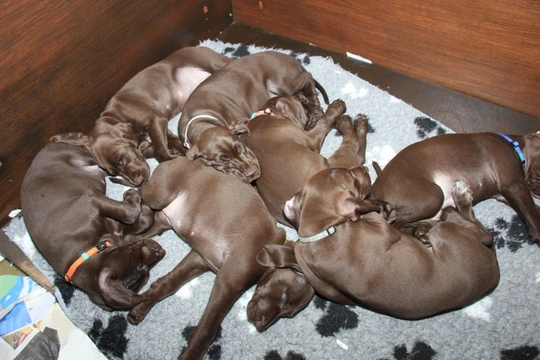Pets
Pets for studWanted petsBreedersAccessories & services
Knowledge hub
Support
Support & safety portal
Seven warning signs of illness to watch out for in young puppies
If you have bred a litter of puppies from your dog, hopefully you made the decision to do so because your dog is a good quality pedigree breed with plenty of demand from owners for your puppies, knowing that you have made a well thought out and responsible decision to breed means that you can enjoy all of the wonderful parts of seeing new life enter the world, and playing with the adorable little fur balls during their very first weeks of life!
Alternatively, you might find yourself with a litter if you have adopted or bought a dog that happened to be pregnant-whether you knew it or not-or if you have agreed to foster a rescue dog with a litter in order to give them the benefits of being raised in a family environment and so, learn about domestic life to give them the best chance of a successful rehoming afterwards.
Having a litter of puppies at home with you can be hugely rewarding and very enjoyable, and while it can of course also be hard work, the dam of the litter herself will take care of the main bulk of the hard work, usually without the need for any human assistance other than the provision of food, and a little babysitting when she needs a break! However, it is very important for anyone that is caring for a litter to learn to identify the warning signs of a problem with one of the puppies as soon as possible, in order to get them the help that they need promptly if required, so that they thrive and reach adulthood happy and healthy.
In this article, we will cover some of the important warning signs of illness to watch out for in young puppies. Read on to learn more.
Early health checks
Puppies are usually delivered by the dam without assistance, with the exception of some brachycephalic breeds like the French bulldog that often need to be delivered by caesarean section. However, it is a very good idea to get the litter seen by your vet a day or so after they have been born, so that your vet can give them the all clear on the health front, and let you know if they spot anything amiss.
After this, assuming that there are no problems, your pups will usually not see the vet again until they are around eight weeks old, and ready for the first stage of their initial vaccinations. This means that it is vital for the person caring for the litter to keep a close eye on the pups in the meantime, in case something goes awry in the interim.
Feeding
It is of course important to ensure that every pup gets enough milk from their dam, and if the litter is large or one puppy is particularly dominant, it is easy for the weaker pups to get pushed to the back and miss their chance to suckle! This is something that you should keep an eye on and try to ensure that every puppy gets a chance to eat, which may mean supervising feedings and moving puppies around to ensure everyone gets their fair share!
In some cases if the litter is very large or the dam’s milk dries up too quickly, you may have to give the pups supplemental milk until they are old enough to move onto solid foods-but even if this is the case, you should try to make sure that all of the puppies get some of their mother’s milk too, as this provides not only essential nutrition, but the benefits of the dam’s immune system too.
Weight gain
Your pups should gain weight at a steady rate during their time with you, and it is important to weigh the puppies every couple of days until they are weaned, to ensure that they are gaining weight. If one puppy is failing to gain weight or is even losing weight, speak to your vet right away.
Temperature
The puppies should be warm at all times, and will usually feel tangibly warm to the touch. If one of the puppies feels colder than the others or is noticeably cool, this is a potential warning sign once more.
Activity
Some puppies are naturally more active and boisterous than others, and of course, all puppies sleep very soundly when they are worn out! However, if one of your puppies is very lethargic and never moves much, or is limp when you pick them up, something may be wrong.
Crying
Puppies tend to be fairly vocal a lot of the time, chattering away with yelps, squeaks and other vocalisations! However, if one of the puppies is crying all of the time or for no obvious reason, they may be ill or ailing, and so you should ask your vet for advice.
Illness
Finally, obvious signs of illness should always be heeded as well, and the symptoms of sickness in young puppies can be hard to identify, which is why it is important to handle and check each puppy over every day. A runny or crusted nose or eyes, problems with the skin or coat or any other symptom such as vomiting, diarrhoea or anything else should all be viewed seriously in young dogs, so let your vet know right away if something seems to be wrong with one of the pups, or with the litter in general.



